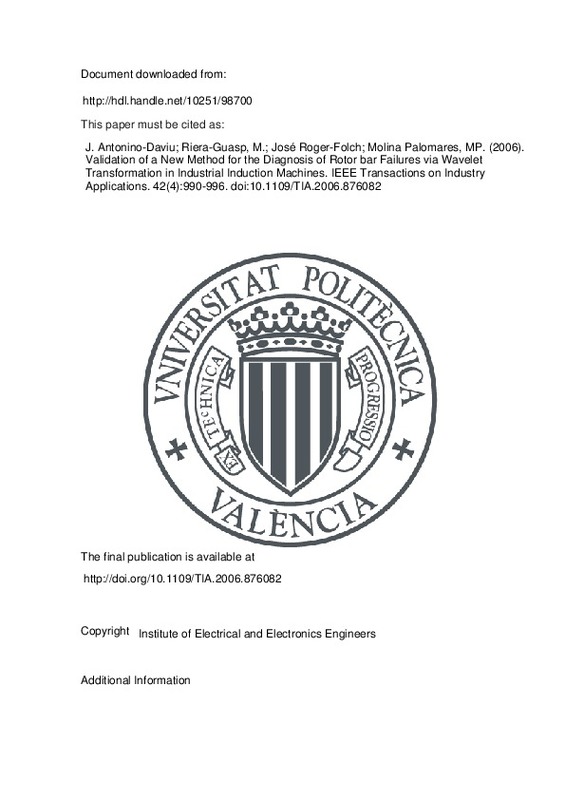JavaScript is disabled for your browser. Some features of this site may not work without it.
Buscar en RiuNet
Listar
Mi cuenta
Estadísticas
Ayuda RiuNet
Admin. UPV
Validation of a New Method for the Diagnosis of Rotor bar Failures via Wavelet Transformation in Industrial Induction Machines
Mostrar el registro sencillo del ítem
Ficheros en el ítem
| dc.contributor.author | Antonino-Daviu, J.
|
es_ES |
| dc.contributor.author | Riera-Guasp, Martín
|
es_ES |
| dc.contributor.author | Roger-Folch, José
|
es_ES |
| dc.contributor.author | Molina Palomares, Mª Pilar
|
es_ES |
| dc.date.accessioned | 2018-03-01T12:33:52Z | |
| dc.date.available | 2018-03-01T12:33:52Z | |
| dc.date.issued | 2006 | es_ES |
| dc.identifier.issn | 0093-9994 | es_ES |
| dc.identifier.uri | http://hdl.handle.net/10251/98700 | |
| dc.description.abstract | [EN] In this paper, the authors propose a method for the diagnosis of rotor bar failures in induction machines, based on the analysis of the stator current during the startup using the discrete wavelet transform (DWT). Unlike other approaches, the study of the high-order wavelet signals resulting from the decomposition is the core of the proposed method. After an introduction of the physical and mathematical bases of the method, a description of the proposed approach is given; for this purpose, a numerical model of induction machine is used in such a way that the effects of a bar breakage can clearly be shown, avoiding the influence of other phenomena not related with the fault. Afterward, the new diagnosis method is validated using a set of commercial induction motors. Several experiments are developed under different machine conditions (healthy machine and machine with different levels of failure) and operating conditions (no load, full load, pulsating load, and fluctuating voltage). In each case, the results are compared with those obtained using the classical approach, based on the analysis of the steady-state current using the Fourier transform. Finally, the results are discussed, and some considerations about the influence of the DWT parameters (type of mother wavelet, order of the mother wavelet, sampling rate, or number of levels of the decomposition) over the diagnosis are done. | es_ES |
| dc.language | Inglés | es_ES |
| dc.publisher | Institute of Electrical and Electronics Engineers | es_ES |
| dc.relation.ispartof | IEEE Transactions on Industry Applications | es_ES |
| dc.rights | Reserva de todos los derechos | es_ES |
| dc.subject | Broken rotor bars | es_ES |
| dc.subject | Fault diagnosis | es_ES |
| dc.subject | startup transient | es_ES |
| dc.subject | Wavelet analysis | es_ES |
| dc.subject.classification | INGENIERIA ELECTRICA | es_ES |
| dc.title | Validation of a New Method for the Diagnosis of Rotor bar Failures via Wavelet Transformation in Industrial Induction Machines | es_ES |
| dc.type | Artículo | es_ES |
| dc.type | Comunicación en congreso | es_ES |
| dc.identifier.doi | 10.1109/TIA.2006.876082 | es_ES |
| dc.rights.accessRights | Abierto | es_ES |
| dc.contributor.affiliation | Universitat Politècnica de València. Departamento de Ingeniería Eléctrica - Departament d'Enginyeria Elèctrica | es_ES |
| dc.description.bibliographicCitation | Antonino-Daviu, J.; Riera-Guasp, M.; Roger-Folch, J.; Molina Palomares, MP. (2006). Validation of a New Method for the Diagnosis of Rotor bar Failures via Wavelet Transformation in Industrial Induction Machines. IEEE Transactions on Industry Applications. 42(4):990-996. doi:10.1109/TIA.2006.876082 | es_ES |
| dc.description.accrualMethod | S | es_ES |
| dc.relation.conferencename | 5th IEEE International Symposium on Diagnostics, Electric Machines, Power Electronics and Drives (SDEMPED 2005) | es_ES |
| dc.relation.conferencedate | September 07-09,2005 | es_ES |
| dc.relation.conferenceplace | Viena, Austria | es_ES |
| dc.relation.publisherversion | http://doi.org/10.1109/TIA.2006.876082 | es_ES |
| dc.description.upvformatpinicio | 990 | es_ES |
| dc.description.upvformatpfin | 996 | es_ES |
| dc.type.version | info:eu-repo/semantics/publishedVersion | es_ES |
| dc.description.volume | 42 | es_ES |
| dc.description.issue | 4 | es_ES |
| dc.relation.pasarela | S\29268 | es_ES |







![[Cerrado]](/themes/UPV/images/candado.png)

